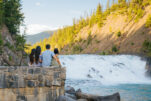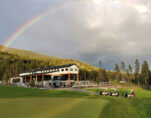Science Smarts: Tiny ecosystems in your own backyard
By PATTY ROOKS on May 7, 2022.
I have been outside enjoying the warmer spring weather this week. It always amazes me what kinds of little critters emerge early in the spring after their long winter nap. Can you believe I had a mosquito buzzing around my head last night? I hope any large swarms of these pesky bugs wait a little while longer before emerging! This really got me to thinking though; with our busy lives we miss so much of our surroundings each and every day. There is so much to explore and learn right in front of us. This week, I wanted to show you that even the teeniest of spaces have so much to offer. Let’s get started! Remember to ask an adult before doing this experiment. Materials • Plastic ice cream lid or Frisbee • Magnifying glass • Science notebook • Pencil • Backyard space to explore Procedure • In your backyard, find a nice area that you would like to investigate further. • Gently place the lid on the ground. • Push the lid into the ground so you can see the ring it forms in the soil or grass. • Leave the lid there for about five minutes. Try to be patient and leave it undisturbed for a little while. • Return and slowly lift the lid. • Write down all of your observations in your science notebook. • Use the magnifying glass to get a really close look. Note everything that you see (dead or alive). Be sure to check under the grass, plants, rocks and even gently dig under the surface of the soil. • Think about how the things contained in this ring are related. Do the insects you found rely on the plants? Are some of the insects predators? How are the insects and plants adapted to the environment Is there any garbage? How might this affect all of the plants, insects and animals? • Once you have finished at this location, try another spot. • How do the two environments compare to one another? What is going on? What you are looking at is a mini ecosystem. An ecosystem is all of the living and non living things in one particular space. Ecosystems are often studied by scientists in order to learn more about nature and environments. Even the tiny little ecosystem you studied can tell us a great deal about the health of the environment. Every single thing in the ecosystem affects every other thing regardless of living or dead. If there is a problem in one part, the entire ecosystem will be affected. Because of this, we need to ensure we do our absolute best to protect every ecosystem no matter the size! Keep an eye on our social media as we have officially kicked off our 30th anniversary celebrations this week. We cannot wait to have you take part. Patty Rooks, Senior Scientific Consultant PRAXIS, “Connecting Science To The Community”. Contact Praxis at praxis@praxismh.ca, http://www.praxismh.ca, Tweet or follow us @PraxisMedHat, or friend us on Facebook. Address: #12 826 11 Street S. E., Medicine Hat, Alberta, T1A 1T7 Phone: 403.527.5365, email: praxis@praxismh.ca. 25-24




